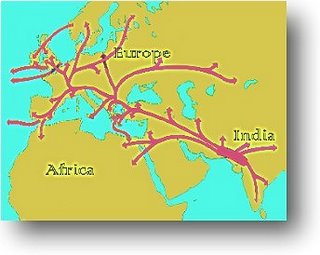Gypsy is a word derived from Egyptian. These people were nomads who first started entering Europe during the Middle Ages (circa 1500) and were thought of by the Europeans to be have come from Egypt. The word Egyptians degenerated into Gypsies with the passage of time as the tribes spread far and wide into every corner of Europe. However they failed to get fully assimilated into the local populace due to their different cultural and religious habits, not to mention their physical distinctness. They were generally thought to have come from Egypt, and in time they too came to believe it.
In the twentieth century, when their language was first analyzed, it came to light that it structurally akin to languages of Northern India like Hindi and Punjabi. A more rigourous analysis proved beyond doubt that the language was very closely related to languages of north India and was derived from those. Further the language also contained words from many other languages like Turkish, Persian, Armenian, Greek and even Polish and German. These languages indicate the general route taken by the Gypsy people during their long journey from India to Europe. When did these people start leaving India and why? Well the answers to these questions is not very clear. But it is generally accepted that these people started leaving India during 1000-1200 AD. It is said that either all of these people started leaving India in one great horde or they left India in many smaller batches. But the general route taken seems to be the same. They seem to have traveled from north india through upper-indus valley into Kashmir, Afghanistan, Iran, Armenia, Turkey and thence into europe. What about the cause of such a huge exodus. The answer to why is still more difficult. Two theories that been propounded. One is that they were a nomadic people (some of which are still found in western india) of itenerant musicians and metalworkers which for some unknown reason started a slow but sustained migration to the west. On the way the adopted the languages and customs of the people they interacted with, even adopting the dominant religions of places they emigrated to. The other commonly proposed theory is that they were warrior tribes, who were involved in resistance during Ghaznavid invasion of India. It is well know that 12th century was a time of great turmoil in the Indian subcontinent. This was primary due to mutiple invasions of Mahmud of Ghazni (in Afghanistan) and the slow but fatal capitulation of Hindu Shahi Dynasty during this period. People would often flee their villages en-masse before the invading army. And thousands of warriors and civilians are known to have been enslaved and taken to Afghanistan during this time.
Whatever the exact details, today most Gypsies are spread all over the world and they identify themselves as Romani's or Roma's. The history of gypsies is surely one of the most facinating accounts of intercontinental migration by entire tribe known to have occured in modern times. It is perhaps only comparable with the similar migration of Turkish people during middle ages starting from Central Asia, all across Asia, to form the modern day Turkey. That will perhaps be another good story...
